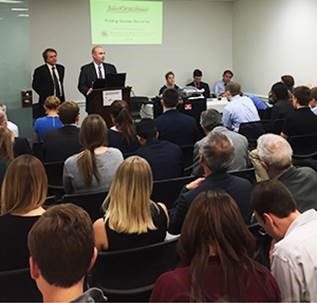Event Recap: How Would Americans Fix Social Security?
On October 18, the Committee for a Responsible Federal Budget co-hosted an event with Voice of the People to discuss the latest findings of their Citizen Cabinet survey on Social Security. Voice of the People founder and president Dr. Steven Kull delivered the results to a packed room of congressional staff, Social Security Administration employees, Social Security advocates, and other policy experts at the U.S. Capitol.

Voice of the People’s survey sample consisted of 8,600 registered voters from across the country, including statewide samples in California, Florida, Maryland, New York, Ohio, Oklahoma, Texas, and Virginia. Participants were asked to participate in an online simulation that walked them through the policymaking process, asking them to make decisions on a wide-range of potential Social Security reforms. The sample, which consisted of individuals from both parties, reached consensus on a number of reforms to strengthen the solvency of the program, something that has remained elusive for lawmakers.
Through this interactive polling, the vast majority of participants supported increasing the amount of income subject to the payroll tax to $215,000 (up from $118,500 today), increasing everyone’s payroll tax rate from 12.4 percent to 13.2 percent, raising the normal retirement age from 67 to 68, and slowing the growth of benefits for the top 25 percent of earners. Selecting similar reforms in our own interactive Social Security Reformer tool, we find these four changes alone would extend the life of the trust fund by 25 years, close three-quarters of the program’s solvency gap, and close half of its structural (75th year) gap.
|
|
|
Voice of the People also found that a more narrow majority support fully eliminating the taxable maximum and raising the minimum benefit, which we estimate that in addition to the proposals above would make Social Security fully solvent over 75 years and close two-thirds of the structural gap. Also incorporating the adoption of chained CPI, which received plurality support among options to change cost-of-living adjustments, would fully close the structural gap. Full results from the study are now available, and you can participate in the simulation yourself here.
Following the presentation, there was a panel discussion on the findings and the importance of addressing Social Security’s impending insolvency. The panel – moderated by Bernie Becker of Politico – included a broad spectrum of perspectives from participants Romina Boccia of the Heritage Foundation, Kathleen Romig of the Center on Budget and Policy Priorities, Dr. Kull, and the Committee for a Responsible Federal Budget’s own Marc Goldwein.
The panel highlighted the importance of this survey as a demonstration that Americans from both parties are interested and capable of working together to solve the problems facing Social Security and even able to come to agreement on several aspects of reform. Goldwein argued that the American people are willing to make trade-offs on Social Security but asserted that politicians are pretending such trade-offs don’t exist. We made this point recently in a blog highlighting Five Easy Fixes that Won’t Save Social Security.
While the speakers held differing views on the specifics of individual reform proposals, they all agreed that the program needs changes to avoid insolvency. As we’ve explained before, Social Security is in relatively urgent need for reform and there are a number of thoughtful options to make the program solvent.
View a full video of the event here or below:
Follow our work on Social Security here and develop your own plan to fix the program with our interactive Social Security Reformer tool.

